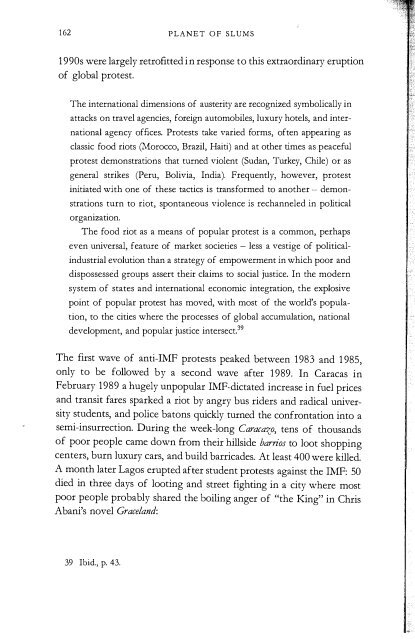Untitled - Rebel Studies Library
Untitled - Rebel Studies Library
Untitled - Rebel Studies Library
Create successful ePaper yourself
Turn your PDF publications into a flip-book with our unique Google optimized e-Paper software.
162 PLANET OF SLUMS<br />
1990s were largely retrofitted in response to this extraordinary eruption<br />
of global protest.<br />
The international dimensions of austerity are recognized symbolically in<br />
attacks on travel agencies, foreign automobiles, luxury hotels, and inter<br />
national agency offices. Protests take varied forms, often appearing as<br />
classic food riots (Morocco, Brazil, Haiti) and at other times as.peaceful<br />
protest demonstrations that turned violent (Sudan, Turkey, Chile) or as<br />
general strikes (Peru, Bolivia, India). Frequently, however, protest<br />
initiated with one of these tactics is transformed to another - demon<br />
strations turn to riot, spontaneous violence is rechanneled in political<br />
organization.<br />
The food riot as a means of popular protest is a common, perhaps<br />
even universal, feature of market societies - less a vestige of political<br />
industrial evolution than a strategy of empowerment in which poor and<br />
dispossessed groups assert their claims to social justice. In the modern<br />
system of states and international economic integration, the explosive<br />
point of popular protest has moved, with most of the world's popula<br />
tion, to the cities where the processes of global accumulation, national<br />
development, and popular justice intersect.39<br />
The first wave of anti-IMF protests peaked between 1983 and 1985,<br />
only to be followed by a second wave after 1989. In Caracas in<br />
February 1989 a hugely unpopular IMF-dictated increase in fuel prices<br />
and transit fares sparked a riot by angry bus riders and radical univer<br />
sity students, and police batons quickly turned the confrontation into a<br />
semi-insurrection. During the week-long Caracazo, tens of thousands<br />
of poor people came down from their hillside barrios to loot shopping<br />
centers, burn luxury cars, and build barricades. At least 400 were killed.<br />
A month later Lagos erupted after student protests against the IMF: 50<br />
died in three days of looting and street fighting in a city where most<br />
poor people probably shared the boiling anger of "the King" in Chris<br />
Abani's novel Graceland:<br />
39 Ibid., p. 43.<br />
SAPING THE THIRD WORLD<br />
De majority of our people are honest, hardworking people. But dey are<br />
at de mercy of dese army bastards and dose tiefs in the IMF, de World<br />
Bank and de U.S . ... Now we, you and I and all dese poor peple, owe de<br />
World Bank ten million dollars for nothing. Dey are all tiefs and I despise<br />
dem - our people and de World Bank people!4o<br />
The Utopian Decade?<br />
According to both neoclassical theory and World Bank projections, the<br />
1990s should have righted the wrongs of the 1980s and allowed Third<br />
World cities to regain lost ground and bridge the chasms of inequality<br />
created by the SAPs - the pain of adjustment should have been<br />
followed by the analgesic of globalization. Indeed, the 1990s, as The<br />
Challenge f Slums wryly notes, were the first decade in which global<br />
urban development took place within almost utopian parameters of<br />
neoclassical market freedom.<br />
During the 1990s, trade continued to expand at an almost unprece<br />
dented rate, no-go areas opened up and military expenditures decreased.<br />
. . . All the basic inputs to production became cheaper, as interest rates<br />
fell rapidly along with the price of basic commodities. Capital flows were<br />
increasingly unfettered by national controls and could move rapidly to<br />
the most productive areas. Under what were almost perfect economic<br />
conditions according to the dominant neoliberal economic doctrine, one<br />
might have imagined that the decade would have been one of unrivalled<br />
prosperity and social justice.41<br />
However, according to the UN's Human Development Report 2004, "an<br />
unprecedented number of countries saw development slide backwards<br />
in the 1990s. In 46 countries people are poorer today than in 1990. In<br />
25 countries more people are hungry today than a decade ago."42<br />
Throughout the Third World a new wave of SAPs and self-imposed<br />
neoliberal programs accelerated the demolition of state employment,<br />
40 Abani, Grace/and, p. 280.<br />
41 Challenge, p. 34.<br />
42 United Nations Development Programme, Human Development Report 2004,<br />
New York 2004, p. 132.<br />
163


